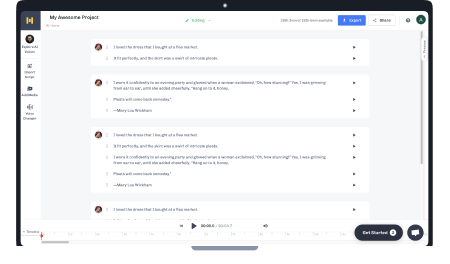Best Text to Speech Software for Linux in 2026

Key Takeaways
- Linux adoption is rising as users seek privacy, flexibility, and minimalism. Increasing demand for Linux-friendly text-to-speech makes reliable TTS tools essential.
- Free TTS options like Piper, Coqui TTS, and eSpeak NG offer offline use, wide language support, and open-source flexibility. However, FOSS tools can be harder to install, offer limited customization, and sometimes sound robotic.
- Cloud-based TTS solutions eliminate Linux setup challenges and provide more polished, scalable voice generation.
- Premium platforms such as Murf, Acapela, and Resemble AI deliver higher-quality voices and richer feature sets.
- Murf stands out for its natural voice quality, multilingual coverage, media tools, and API support.
Computer users worldwide are starting to shift toward Linux for a variety of reasons. Windows users are seeking more privacy and want an OS that is minimalistic. On the other hand, macOS users may find Apple's ecosystem too restrictive.
With more users choosing Linux, many will benefit from integrated or third-party text-to-speech (TTS) software — helpful for accessibility, hands-free reading, or multitasking. But given the variety of TTS options, choosing the right one can be confusing.
In this article, let’s look at the best free and paid Linux text-to-speech software available in 2026.
Free and Open-Source Linux TTS Solutions
1. Piper
Piper is a free, open-source neural text-to-speech engine maintained at OHF‑Voice (former Rhasspy) with the following capabilities:
- Generates natural, human-like speech using neural TTS models — higher quality than traditional formant synths.
- Runs fully offline, no cloud services required — good for privacy and offline workflows.
- Supports multiple voices, languages, and accents — with downloadable ONNX-based voice models (various quality levels like x_low, low, medium, high).
- Offers both a command-line interface (CLI) and API (Python/C++) for flexible integration.
How to get started:
- Install via Python: run
pip install piper-tts
then use the piper command.
- Alternatively, download a prebuilt Linux binary from the project’s releases page. Extract it, then run something like:
echo "Hello world" | ./piper --model en_US-lessac-medium.onnx --output_file hello.wav
to produce a speech audio file.
- For advanced uses, you can integrate Piper into applications via its API or embed it in local voice-assistant / home-automation setups.
2. Coqui TTS
Coqui TTS — an open-source deep-learning toolkit for text-to-speech (TTS), available on GitHub. Users can look forward to the following core features:
- Generates natural, human-like speech using advanced neural-TTS and vocoder models (e.g. Tacotron2, Glow-TTS, etc.).
- Supports multi-speaker, multilingual speech — many languages and voice styles included.
- Offers voice cloning and cross-language voice transfer, allowing you to clone a voice (from a short audio sample) and make it speak in different languages.
- Provides both command-line and Python APIs, giving flexibility for scripts, automation, or integration into apps.
How to get started:
- Install via Python:
pip install coqui-tts
- Then, in terminal or a Python script, call the library (e.g., tts --model_name tts_models/en/vctk/vits) to synthesize your text.
- Optionally, you can clone the repository for advanced use, explore many pretrained models, or even fine-tune or train your own.
Even though the original company behind Coqui shut down, the project remains active under community maintenance — so the code, models, and functionality are still usable for free.
3. eSpeak NG
eSpeak NG is a compact, free, open-source text-to-speech synthesizer for Linux and other platforms. This option is widely chosen because it:
- Supports more than 100 languages and accents, making it widely usable globally.
- Uses a light, formant-synthesis engine — so it remains small in size while offering fast, clear speech output.
- Can output speech directly via audio device or generate sound files (e.g., WAV) for later playback.
- Offers flexibility with different voices, allows for changing pitch or speed, and even outputs phoneme codes or integrates with other back-ends like MBROLA.
How to get started:
- On most Linux distributions (e.g., Debian/Ubuntu), simply install eSpeak via package manager:
sudo apt-get install espeak-ng
- Then run a basic command like:
espeak-ng "Hello, world"
- You can also pass a text file:
espeak-ng -f file.txt
- And to save output to a WAV file:
espeak-ng -w output.wav
Considerations When Using FOSS TTS Linux Platforms
When setting up Linux text-to-speech to get audio files from text with FOSS models, users must be wary of the following limitations in Ubuntu or any other Linux distributions:
- Installing open-source TTS tools requires technical assistance: Most engines rely on command-line workflows, model downloads, or manual dependency setup. New users may struggle with package conflicts, GPU requirements, or compiling components from source. A guided setup helps avoid these hurdles and ensures the engine runs efficiently.
- Customization options are limited across FOSS platforms: While some offer tuning controls for speed or pitch, deeper adjustments—such as emotional tone, prosody shaping, or fine-grained voice design—require advanced configurations or custom training. These tasks demand technical knowledge and hardware resources that many users lack.
- Voices in free TTS engines can sound robotic: Especially when compared to premium cloud providers. Formant-based tools produce clearer but mechanical output, while neural engines produce natural-sounding voices whose quality depends on model size and training data.
- Fewer language options: These tools are maintained by the FOSS community, who aren't paid by a company or a commercial organization. As a result, their evolution over the years in terms of language support has been limited. This makes them less useful for business use cases where a professional converts text into voices in multiple foreign languages.
Premium TTS Platforms for Linux
1. Murf
Murf is a cloud-based, premium text-to-speech platform that works across operating systems — including Linux through browser or API access.
The leading text-to-speech solution has the following main features:
- Highly realistic AI voices. Murf offers 200+ AI voices in over 20 languages. Voices feature natural prosody, intonation, and emotional variation, producing human-like speech rather than robotic output.
- Voice customization. You can adjust pitch, speed, emphasis, pauses, and even fine-tune pronunciations (e.g., for brand names or unusual words). This ensures your voiceovers match tone and clarity needs.
- Multilingual & accent support. Murf covers many languages and accents — useful for global content, marketing, or multilingual audiences.
- Full media integration. Beyond plain text, Murf supports syncing voiceovers with images, videos, presentations, making it ideal for marketing, e-learning, ads, or social media content.
- API & scalability. Murf offers a streaming-TTS API (Murf Falcon) with low latency (≈ 55 ms) and support for scalable, high-volume voice generation applications in creative and development tools.
2. Acapela
Acapela TTS for Linux Embedded — a premium TTS solution from Acapela Group — offers a robust, commercial-grade text-to-speech for Linux applications and embedded devices. Its key offerings include:
- 120+ voices across 30+ languages, covering many dialects and regional accents — ideal for global or multilingual projects.
- Neural/AI-based voices, delivering natural, expressive speech rather than robotic output.
- User lexicons, SSML, raw text, and phonetic input for precise pronunciation, useful for brand names, acronyms, or unusual words.
- Integrates via C/C++ API, making it suitable for developers building custom applications, assistive tools, or voice-enabled systems.
3. Resemble AI
Resemble AI is a commercial-grade TTS and voice-cloning platform offering high-fidelity AI-generated speech for web, desktop, and developer use. With this solution, Linux users can:
- Transform plain text into natural-sounding speech with human-like intonation, rhythm, and emotion — far smoother than classic robotic TTS.
- Clone a voice and generate speech in that specific voice.
- Feed in recorded audio, and Resemble can alter its voice while preserving emotion and natural delivery — useful for dubbing or voice transformation.
- Generate audio for global audiences with multilingual content needs.
- Integrate the API into apps, games, chatbots, or automated workflows — ideal for businesses and creators building scalable voice-enabled solutions.
Murf: The Best Text-to-Speech Synthesis Engine for Linux
Among so many, Murf is the best option for Linux users to produce voices from written text for the following reasons:
- Ultra-realistic voice quality: Its advanced neural model (“Speech Gen 2”) produces highly natural, human-like speech with expressive prosody, intonation, and emotion.
- Vast multilingual and multilingual-accent library: Offering over 200–300 voices across 33 languages and many accents, Murf supports global and local content needs.
Fine-grained customization: You can adjust pitch, speed, emphasis, pauses, and pronunciation. This gives control to match voiceovers to brand tone, storytelling style, or audience expectations. - Integrated media tooling: Murf isn’t just about generating speech — you can sync voices with images, videos, or presentations. This makes it ideal for e-learning, marketing videos, podcasts, or narrated content without needing external tools.
- Developer-friendly API access: For automation, apps, or large-scale workflows, Murf offers an API with support for many voices and output formats.
For Linux users — whether creators, educators, marketers, or developers — Murf offers a near “set-and-forget” TTS solution: no local installation hassles, no model downloads, and extremely polished voiceovers.
Ready to produce audio in several languages with Linux text-to-speech?
Sign up for Murf today and get free ten voice generation minutes.

Frequently Asked Questions
What is text to speech (TTS) software for Linux?
.svg)
Text to speech (TTS) for Linux refers to software applications or libraries designed to convert written text into spoken words on the Linux operating system. These tools enable users to listen to text-based content such as documents, web pages, or e-books instead of reading them, providing accessibility options for individuals with visual impairments and enhancing user experiences in various applications.
How does TTS software work on Linux platforms?
.svg)
TTS software on Linux processes textual input using algorithms that analyze linguistic elements. It then generates corresponding speech signals, which are outputted through audio devices, enabling users to hear the synthesized speech. Users can opt for any tool or other Linux distribution to get the TTS installed.
How to convert text to speech in Linux?
.svg)
To convert text to speech in Linux, users can install and configure TTS software, then utilize command-line tools or integrate TTS functionality into applications to generate speech output from text input. The speech synthesizer and command-line program convert the text to English or other languages as per user requirements.
Can I customize the voice in TTS on Linux?
.svg)
Yes, many TTS software options for Linux offer voice customization features. Users can often modify parameters such as pitch, speed, and intonation to tailor the voice to their preferences.
Which Linux distributions support TTS software?
.svg)
Most mainstream Linux distributions support TTS software, including Ubuntu, Debian, Fedora, CentOS, and Arch Linux, among others. Users can install TTS software packages from their distribution’s package repositories.
What file formats does TTS software on Linux support?
.svg)
TTS software on Linux typically supports a variety of file formats for textual input, including plain text files (.txt), rich text format (.rtf), and markup languages such as HTML and XML. On some platforms, audio files can also be used as the final output under TTS.
Can TTS software handle multiple languages on Linux?
.svg)
Yes, many TTS software options for Linux support multiple languages and offer a diverse selection of voices in various languages and dialects. Some platforms also support real-time translations as users speak text.
Is there support for real-time TTS on Linux?
.svg)
Yes, some TTS software options for Linux offer real-time synthesis capabilities, enabling immediate conversion of text input into speech output with minimal latency. It depends on the text to speech software.
What are the accessibility features of TTS on Linux?
.svg)
TTS on Linux enhances accessibility by providing auditory feedback, enabling users with visual impairments or reading difficulties to access digital content, navigate interfaces, and interact with applications effectively. It also supports features like screen readers and voice commands, further improving accessibility for users with disabilities. It converts text to audio in various formats, like MP3 and WAV files, in the supported languages with command line options.















